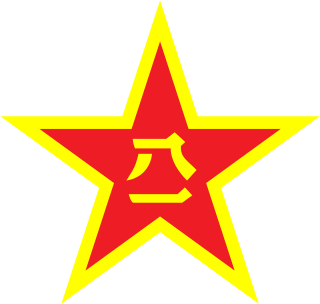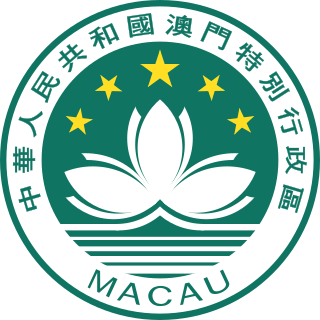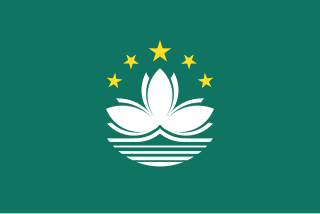
The People's Liberation Army Macao Garrison is a garrison of the People's Liberation Army (PLA), responsible for defense duties in the Macau Special Administrative Region (SAR) since the sovereignty of Macau was transferred to China in 1999.

The Standing Committee of the National People's Congress (NPCSC) is the permanent body of the National People's Congress (NPC), the national legislature of the People's Republic of China. It exercises the powers of the NPC when it is not in session.

The Basic Law of the Hong Kong Special Administrative Region of the People's Republic of China is a national law of China that serves as the organic law for the Hong Kong Special Administrative Region (HKSAR). Comprising nine chapters, 160 articles and three annexes, the Basic Law was composed to implement Annex I of the 1984 Sino-British Joint Declaration.

The chief executiveof the Hong Kong Special Administrative Region is the representative of the Hong Kong Special Administrative Region and head of the Government of Hong Kong.

Edmund Ho Hau Wah, GML, GCM, GOIH is a Macau politician who served as the first Chief Executive of the Macau Special Administrative Region from 1999 to 2009. He currently serves as a Vice-Chairman of the Chinese People's Political Consultative Conference.

The chief executive of the Macao Special Administrative Region is the head of government of Macau, a special administrative region of China. The position replaced the office of Governor of Macau, the former head of Macau as an overseas province of Portugal. Under the Basic Law of Macau, the chief executive's role is to:
...be the head of the Macau Special Administrative Region and shall represent the Region. The Chief Executive of the Macau Special Administrative Region shall be accountable to the Central People's Government and the Macau Special Administrative Region in accordance with the provisions of this Law.

The Legislative Assembly of the Macau Special Administrative Region is the organ of the legislative branch of Macau. It is a 33-member body comprising 14 directly elected members, 12 indirectly elected members representing functional constituencies and 7 members appointed by the chief executive. It is located at Sé.
The Basic Law of the Macao Special Administrative Region of the People's Republic of China is the organic law that establishes the Macau Special Administrative Region, replacing the Estatuto Orgânico de Macau. It was adopted on 31 March 1993 by China's National People's Congress and promulgated by President Jiang Zemin; it came into effect on 20 December 1999, following the handover of Macau from Portugal to China.
Human rights in Macau refers to the basic rights of citizens of Macau, a former Portuguese colony that reverted to Chinese administration in 1999. As a Special Administrative Region (SAR) of the People's Republic of China (PRC), Macau enjoys a high degree of autonomy, except in defence and foreign affairs, and its citizens have basic freedoms and enjoy legally protected rights. The Macau Basic Law is the SAR's constitution, promulgated by PRC's National People's Congress (NPC) in 1993.
The Hong Kong order of precedence is a nominal and symbolic hierarchy of important positions within the Government of Hong Kong. Administered by the government's Protocol Division, the hierarchy does not determine the order of succession for the office of Chief Executive, which is instead specified by the Basic Law of Hong Kong.
The Government of the Macau Special Administrative Region, commonly known as the Macau Government, is the executive authorities of Macau. Formed on 20 December 1999 in accordance with the Sino-Portuguese Joint Declaration, it is headed by secretariats or commissioners and report directly to the chief executive. The affairs of the government are decided by secretaries, who are appointed by the chief executive and endorsed by the State Council of the Central People's Government in Beijing. As a special administrative region of China, Macau has a high degree of autonomy, in light of the "One Country, Two Systems" policy. The Macau Government, financially independent from the Central People's Government, oversees the affairs of Macau.

Fernando Chui Sai On is a Macau politician who served as the 2nd chief executive of Macau from 2009 to 2019. He served as secretary for social and cultural affairs from 1999 to 2009.

The following outline is provided as an overview of and topical guide to Macau:

The Hong Kong and Macao Work Office, concurrently known as the Hong Kong and Macao Affairs Office of the State Council (HMO), is an administrative office of the Central Committee of the Chinese Communist Party responsible for promoting cooperation and coordination of political, economic, and cultural ties between mainland China and the Chinese Special Administrative Regions of Hong Kong and Macau. It was formed in 2023 on the basis of then State Council's HKMAO. Its head office is in Xicheng District, Beijing.
Legislative elections were held in Macau on 15 September 2013 according to the provisions of the Basic Law of Macau. This election was the first of its kind succeeding the reform of the Legislative Assembly that created four new seats; two new geographical constituency seats and two new functional constituency seats. Out of a total of 33 seats, 14 were elected by universal suffrage under the highest averages method, while 12 were voted on from the Functional constituency, and 7 from nomination by the Chief Executive.

The National People's Congress (NPC) is the highest organ of state power of the People's Republic of China (PRC). The NPC is the only branch of government in China, and per the principle of unified power, all state organs from the State Council to the Supreme People's Court (SPC) are subservient to it. With 2,977 members in 2023, it is the largest legislative body in the world. The NPC is elected for a term of five years. It holds annual sessions every spring, usually lasting from 10 to 14 days, in the Great Hall of the People on the west side of Tiananmen Square in Beijing.
The Hong Kong Special Administrative Region Basic Law Drafting Committee (BLDC) was formed in June 1985 for the drafts of the Hong Kong Basic Law for the Hong Kong Special Administrative Region (HKSAR) after 1997. It was formed as a working group under the National People's Congress. The Drafting Committee had 59 members, of whom 23 were from Hong Kong and 36 were from Mainland, mostly the PRC government officials. The Drafting Committee was dominated by Hong Kong businessmen with a share from different social sectors. The decisions of the Drafting Committee on the political structure and legal system of the HKSAR had a great impact on the politics of Hong Kong today.
The Decision of the Standing Committee of the National People's Congress on Issues Relating to the Selection of the Chief Executive of the Hong Kong Special Administrative Region by Universal Suffrage and on the Method for Forming the Legislative Council of the Hong Kong Special Administrative Region in the Year 2016, commonly known as the 31 August Decision, is a decision made by the Standing Committee of the National People's Congress (NPCSC), the national legislative body of the People's Republic of China (PRC) on 31 August 2014 which set limits for the 2017 Chief Executive election and 2016 Legislative Council election in the Hong Kong Special Administrative Region (HKSAR).

The 2021 Hong Kong electoral changes were initiated by the National People's Congress (NPC) on 11 March 2021 to "amend electoral rules and improve the electoral system" of the Hong Kong Special Administrative Region (HKSAR) for its Chief Executive (CE) and the Legislative Council (LegCo), in order to ensure a system in which only "patriots", according to the Chinese definition, govern Hong Kong. The reforms have been widely criticized for their negative impact on the democratic representation in the Hong Kong legislature.
Chief Executive elections were held in Macau on 15 May 1999 to elect the first Chief Executive (CE), the highest office of the Macau Special Administrative Region, before Macau was due to be handed back to China by Portugal. Edmund Ho was elected as the first leader of the Macau SAR. This was the only contested Chief Executive election to date.















